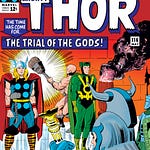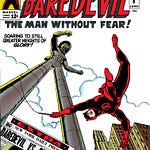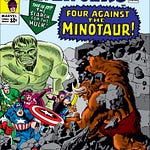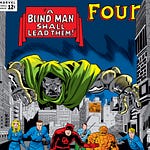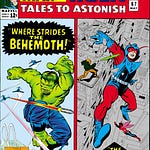In this episode:
Mike and Ed discuss life after being an Avenger. What are the responsibilities? What are the privileges? Do they get top secret briefings? Are they like ex-Presidents? Or like ex-FBI? Who pays for the damage they cause when Giant-Man decides to grow to 35-feet in the middle of the city and starts knocking down buildings? These are unprecedented times, but someone has to figure this out quickly!
Behind the comic:
This is the first adventure of Giant-Man and the Wasp post-Avengers. The story continues into the next issue, but at that point they “retire” and the title converts to dual stories of Namor and the Hulk. It turns out Giant-Man just wasn’t that popular. It didn’t help that Tales to Astonish had consistently been one of the weaker titles for the previous few years. Something needed to change. Also in this issue, the Human Top, who was originally introduced as a “normal human” who just happened to be able to spin quickly, has now developed the ability to fly…
In this issue:
Giant-Man and the Wasp are practicing just outside the city. A plane intentionally flies into Giant-Man, and the pilot, the Human Top, considers killing him but does not have time before Giant-Man wakes up. The Top splits, and Giant-Man returns home. Giant-Man practices his growing ability in downtown Manhattan. The Human Top then returns and battles Giant-Man and the Wasp, and Giant-Man is enraged when the Top leaves with a captured Wasp.
In the Hulk story, the Hulk saves Major Talbot from dying during the Leader’s attack. Then, when the Hulk has turned back into Bruce Banner, General Ross places him under arrest for treason. The leader sends his humanoid minions to the base where Banner is being held, and while they attack Banner, he turns back into the Hulk and battles them but is knocked out as they steal an invention of Banner’s for the Leader’s use.
Assumed before the next episode:
People are fed up with Giant-Man leaning on their buildings, carelessly causing damage.
This episode takes place:
After Giant-Man has leaned on one too many buildings.
Full transcript:
Edward: Mike, what do you do when you retire from the Avengers? What's next? What's next on your plate?
Michael: I don't know. It's hard to go higher in the superhero community, but it's also harder to get a better job in even the military or that kind of like super diplomacy community
Edward: and super diplomats.
Michael: Well, that's what they are, right? Like they're like, I don't know, like Warrior Kings in a way. Right?
Edward: Thank you for your service, giant man. I'd not like you to be the diplomat in charge of Poland. Over there with the wasp. You can help us deal with geopolitical situations in the Eastern Republics.
Michael: But that's what they've been doing though. They've been acting as
Edward: the last time giant man went into the Eastern Europe, he was crashing through the Berlin wall. It's not diplomatic, it's not known for diplomacy.
Michael: No, but his actions, whether they're clumsy or not, were actually affecting international relations. So that's what I mean, like the general sense of whatever they are.
Edward: Yeah. So causing diplomatic relations is not the same as being a diplomat, just cuz they both have the word diplo in them.
Michael: No, no, no. I'm not saying that they're, I'm not saying that that's the job. It's just that what have the Avengers been? They've saved the world. They've battled villains. They have taken upon their self to go to other countries, to act in America's interests.
And then at times we've found that they've acted secretively to the same extent, further in the interest and theory of America. So I don't know what you want to call them, but they're not regular. And so you're, they're not regular. And, and your question at the start was like, well, what do you like, what do you do when you retire?
Well, it's not unprecedented, but it's unusual. And so it's a good question.
Edward: And so what's unusual, you're saying retiring as a superhero is unusual or retiring as an avenger is unusual. What's unusual?
Michael: Retired from the Avengers is unusual because, well, yes, it's Avenger.
Edward: Avengers have only been around for a couple years. No one has retired until now. But now we've had, now we have three retirements, sorry, four retirements, 1, 2, 3, 4, all at the same time.
Michael: Yeah. And my point is that it's unusual. We have an experience where someone with that much power who's had such a fascinating role and influence on world affairs, is now no longer in that position?
I think there's a qualitative difference between being on the Avengers and being the go-to team for. Pretty much any big problem to be on their own. Are they still on the payroll or at least getting the status and the influence they had on Avengers?
Edward: I wouldn't think so. If you're not, you can't be like, not on the Avengers, but still getting all the Avenger privileges.
Michael: That's right. So that's what I mean. Somebody that tied in to International affairs in such a highly visible way and such an influential position, I would think that they don't just retire and, then our intelligence organizations are like, that's cool.
I guess you just. Have all this knowledge and this know-how, and you just go off and do what you want. So I'd imagine that there's something that must tie them closer. Oh, I see what you're saying. It's like maintain them and to be still being sort of a post adventure, but still in the family. You know what I mean?
Edward: Got it. You're a post, you're not in ave anymore, but now you're a post a event. It's like a presidents. When presidents retire, they still have the secret service. Follow them around everywhere. They still get paid. Right., if you're an ex-president, you still get a salary.
Michael: I think so. Or some kind of pension, I don't think they'd wait till like they're, you know, like most of 'em seem to be quite old when they're president, when they retire. I don't think they, they have to wait long before they get the stipend. Right. Which makes a lot of sense as well, cuz you don't want them to Go out and say, I've been the president of the United States for eight years and now I'm interviewing for this job at General Electric.
Or I might go, I think I'd like to go work in Hungary. You know what I mean? I don't think that they're gonna be like, what's next for me? As if it's just like anybody in the world. They're just not. And so I think get to pay them enough to keep them on the bench in a way, and still get to know-how and the benefit of the expertise and still have them available to contact them.
I would think.
Edward: Okay, there's an ex-presidents club. You think there's gonna be an ex Avengers club where they all get together and come back together and talk about, I dunno, I guess the new Avengers can ask the old Avengers for advice the presidents do that sometimes. Yeah.
Michael: I think so. I mean, I'd like to think so because the alternative would be that the Avengers, so somebody who's been so tied into our security and the intelligence organizations, but also our military and our political affairs is just suddenly like, huh. Well, I gotta make a living not an Avenger anymore.
Edward: Maybe I'll go rob Banks,
Michael: right? Or maybe I will go maybe work for, another country. I mean, like they could, and it's unusual, like the adventures started as this voluntary group, but very quickly became integral to our security intelligence organizations, et cetera.
but I bet that there are those types of organizations and associations already. I bet they just attach that type of structure over to the Avengers to make sense.
Edward: Paul, you're saying there's other structures like the Avengers out there?
Michael: You used presidents ex-president, as an example.
I think there has to be some kind of process they can follow to say, time.
Edward: But the difference is the presidents, like that's part of the constitution, like that's built into the fabric of our country and there are rules and regulations that go back. Hundreds of years. The Avengers are a couple years old.
We don't even know exactly how the Avengers are affiliated with their government, how they're affiliated with Stark Corp. They're all part of this military industrial complex, and I don't think we understand what's going on. It's definitely not the way we understand what happens with the president.
Michael: Well Ed, I'm not saying I'm cool with it. I find it to be the most weird you know, and people that listen to our show know this. I've always found it to be the weirdest thing that the military, the government, our intelligence organizations are like, I don't know, better get the adventures involved. I've always found it to be strange, but whether it's strange or not, they're tied in and they have this connection and they have this. Powered authority in our society. So just to have them float off and possibly just what, decide that they want to, take what they know and not do anything with it, or,
Edward: yes. You're basically say we should bribe them so that they don't do that. We should have tax dollars go towards paying giant man and Thor and Iron Man in the wasp and tell them, Hey, here's a hundred grand. Uh, please don't work for the Russians.
Michael: I think, I wouldn't use the word bribe, but I think it's incentivized, I suppose, but's be honest, let's be honest. You, I've had shows where, where your solution is like, I guess we gotta kill them. Or lobotomized them. I'm like, no, I'm just following your well trod path on this one. Like probably need to pay them is the better alternative than like, Like, where I know you want to go on these things where it's like, too dangerous of your life. See you later.
Edward: You know, I'm gonna tell your wife about the things you've been doing, unless you give me an incentive to not do that
Michael: well yeah. It's, like, protection, money protection.
Edward: I'm not gonna, uh, bust into your shop, but, you know, I need some incentive to make sure that it stands up. Okay.
Michael: But Ed, you wouldn't characterize it as bribing that you say, Let's say Kennedy, who's a young president, let's say. He hadn't been assassinated and he continued on, and he retired after, let's say he served two terms. He would've been in his early fifties, you wouldn't have considered bribery to pay him a pretty healthy pension.
Edward: No, you're, right. It's not bribery to have to pay someone to do their job.
Michael: It's a role.
Edward: It's an incentive pay. It's an incentive. So that you go and do The Thing that we we're paying you to do. I think bribe, connotates something illegal, right? Or something underhanded. What's what's going on here though, is, it kind of is underhanded, because it's not public, it's not well-known.
Is Stark Corp paying their post avenger salary? Is it the government? That's to me the, big question. And the other thing is that well at least giant man is still active. We haven't heard much from about Thor Iron Man, but, it's Giant man is out there. Experimenting and doing more stuff. Like the latest things on Giant Man is he can now grow to 35 feet tall. He's getting bigger and bigger, so his power levels are increasing. And he's doing it right in the city. He's damaging buildings, he's doing practices. He weighs tons with tons and tons of weight, and he's walking through the city causing damage.
And so in the past when that happened, the Avengers had some sort of fun that paid for that stuff. Is there a post Avengers payment fund now too?
Michael: That's part of the reason why I was thinking about this, there has to be some kind of structure in there. Not just about the idea that they have information that would be damaging, to our interests if they went somewhere else, for instance.
But also if giant man is practicing growing in the cities, and holding onto buildings so he doesn't fall down. He's causing damage. And in the past, it's still irresponsible them to do that. But at least there is some kind of recourse for the regular person or insurance companies. He get some kind of, kind of like, you know, fix, fix the masonry on this. You know, like
Edward: fix, it's like an irresponsibility reading. As an avenger you can have a 10 on irresponsibility, but now that you're post Avengers, let's bring that irresponsibility level down to a six or a seven.
Michael: And he hasn't, you know what I mean?
Practicing growing around buildings when you wait tons and could knock one over if you just tripped, is not responsible.
Edward: And also grabbing, grabbing onto the edges of buildings and like having bricks fall off. It just seems a little dangerous.
Michael: It's super dangerous. So that's why I think that there must be something in the way, some process or some similar continuation of coverage.
Really. Like I know when lawyers retire, we have mandatory insurance and then when you retire you can have runoff insurance, which would cover you. So you might get a claim, there's only so long you can Sue your former lawyer there's limitation periods and then you'd wanna make sure you cover. So if you did get sued,
Edward: the insurance covers you, not for the time that you were a lawyer, but the insurance is covering you for right now. Like, for example, if you stopped your insurance today, And you got sued for something you did yesterday, the insurance wouldn't cover you.
Michael: No, so insurance covers terms, so as long as you have occurrence base and claims based policies, but the most common policy would be like if you get into a car accident, you have insurance policy with company A, and then you get sued two years later. B, you no longer are insured you by that company. You're run to another insurance company. It's the company that was on risk that would cover you. And so I'm saying for, Lawyers when they retire, they wanna make sure they've got insurance and coverage, to continue a bit longer.
I see I'm diving into stuff. I'm not a hundred percent sure I'm far from retirement, but I just know that there is coverage up.
Edward: There's something, there, something, there's something's something there that's a giant man probably has some sort of insurance policy that's covering him post Avengers, some sort of runoff policy that lasts for some period of time.
Michael: Or you just have the Avengers have so much money at their disposal. They're either self-insured in a sense, or they just have money to pay. But whatever it is, I think that you don't have these retired Avengers running around causing damage and then not, and then what you're gonna Sue giant man, you're gonna find out where that guy, who he really is. Or do you still follow the process that is in place that we we're aware of where they could make a claim. Because of the damage that the Avengers caused, which I think is a way that's kept people kind of okay with them in general.
Edward: So if he has to have this coverage that keeps lasting, like we're kind of paying for giant man for the guess for the rest of his life or for some time period.
Does he have responsibility then too? This is like reserves in the military. I think we can call back up giant man if the Hulk was rampaging through the city and we're like, you know what? The Avengers are a little weak right now. We need some, uh, we need some more bench strength.
Can he be called in?
Michael: I don't know. I mean I would think so. I would think that's part of the deal. Like we said at the beginning, it's unusual and unprecedented about what they are in our society, but they are unusual. They are unprecedented is so, you and I are just trying to speculate about what should make sense.
And I think what makes sense is that if they're out there, Having information or abilities that could harm us if they were no longer on our side. I think that there's a built-in incentive to have them close to home, really. But also if they're out there doing activities, and they're more or less government agents, which they have been.
I think there should be some kind of recourse for regular people. Otherwise people would not be as keen about Giant man doing his calisthenics in the middle of the city.
Edward: Like you're sounding more and more like the Avengers are like the mafia. Once you're in, you can't get out. You think you're out and we pull you back in.
Michael: I'm not saying that they're not like that.





